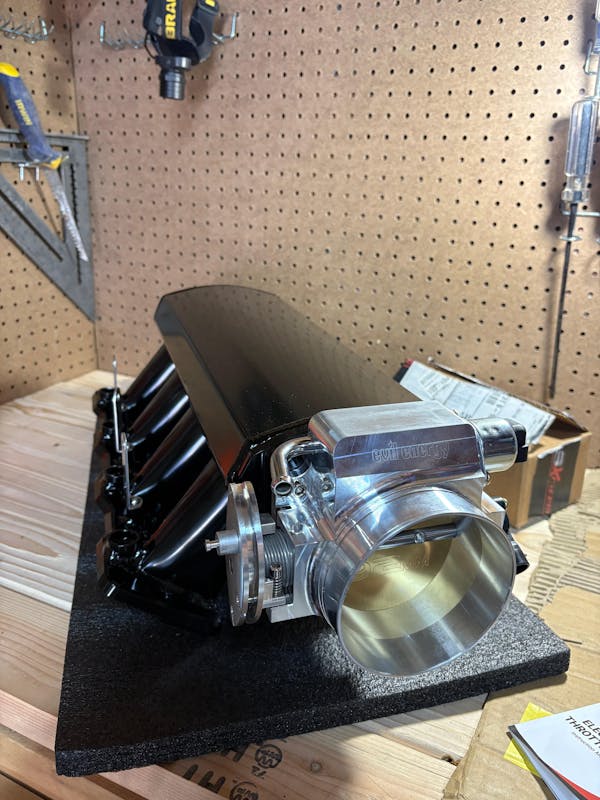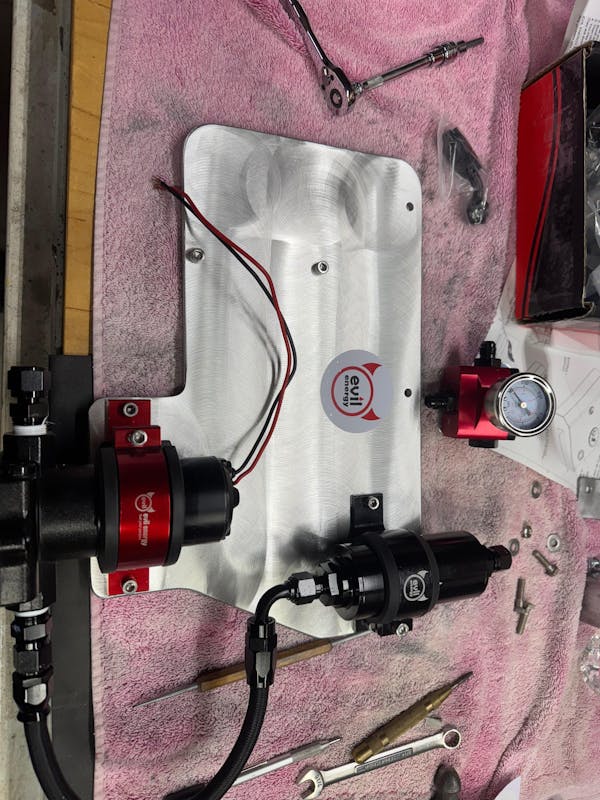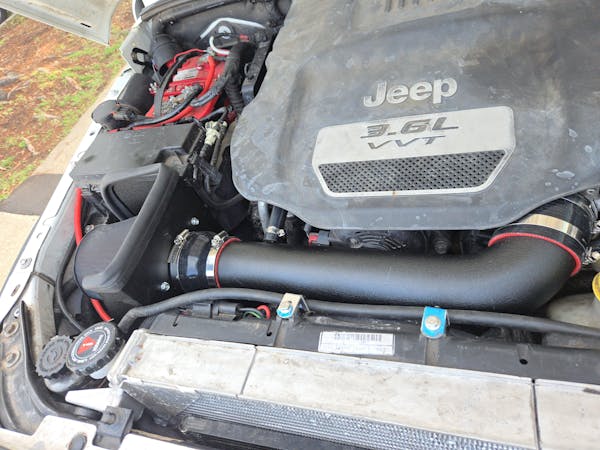-
EVIL ENERGY 255LPH High Pressure External Electric Fuel Injection Pump 12V-13.5V - Stable Performance for EFI Vehicle Systems - Red---!@!start!@!---Specifications---!@!end!@!--- Inlet 5/16-inch Outlet 3/8-inch Installation Location External fuel pump Structural Category Electric fuel pump Structural Sub-Category Gear-type electric fuel pump Required Fittings/Tubing Direct connection to 5/16-inch rubber tubing Voltage 12V-13.5V Max Flow Rate 255LPH Closed Pressure 150PSI Flow Rate 215-255LPH(3.9-4.1PSI&5.0-6.0A) 160-200LPH(42-43PSI&7.2-8.0A) 130-150LPH(75PSI&8.9-9.5A) 58-95LPH(115-114PSI&11.8-12.3A)...
- $30.99
- $30.99
$49.99- Unit price
- per
-
Red
-
Black
-
EVIL ENERGY External Inline Fuel Pump Electric 300LPH High Flow 12V Universal
- $60.19
- $60.19
$71.99- Unit price
- per
-
EVIL ENERGY 290LPH High Pressure External Electric Fuel Injection Pump 12V-13.5V - Reliable High-Performance for EFI Tuned/Modified Cars (AN Adapter Optional) - Black---!@!start!@!---Specifications---!@!end!@!--- Inlet 3/8-inch Outlet 3/8-inch Installation Location External fuel pump Structural Category Electric fuel pump Structural Sub-Category Gear-type electric fuel pump Voltage 12V-13.5V Max Flow Rate 290LPH Closed Pressure 100PSI Flow Rate 275-290LPH(5.9-6.0PSI&8.0-8.9A) 185-217LPH(42PSI&11-11.3A) 115-145LPH(70PSI&12.5-13.5A) 30-95LPH(87-80PSI&14-14.5A) Temperature Range -68°-194°F Max Power 188W Application for...
- $42.99
- $42.99
$58.99- Unit price
- per
-
Black
-
Silver
-
EVIL ENERGY Electric Intank/External Fuel Pump High Flow Kit Fit for 12V DC EFI system
- $15.99
- $15.99
- Unit price
- per
-
EVIL ENERGY 320-370lph/90GPH External Electric Fuel Pump 12V for Carburetor - High Pressure Compatible for Carburetor Replacement/Modified Vehicles---!@!start!@!---Specifications---!@!end!@!--- Inlet 3/8-inch Outlet 3/8-inch Installation Location External fuel pump Structural Category Electric fuel pump Structural Sub - Category Gear-type electric fuel pump Voltage 12V-13.5V Closed Pressure 14PSI Flow Rate 91.1-97.8GPH/345-370LPH(10-11PSI&5.6-6.0A) 84.5-91.1GPH/320-345LPH(7-9PSI&5.5-6.3A) Temperature Range -68°-194°F Max Power 88W Material Aluminum Gross Weight 1.4kg Packaging...
- $76.99
- $76.99
$76.99- Unit price
- per
-
EVIL ENERGY 405LPH High Flow High Pressure External Electric Fuel Injection Pump 12V-13.5V - Racing-Grade for EFI Modified Cars---!@!start!@!---Specifications---!@!end!@!--- Inlet M18*1.5 Outlet M12*1.5 Installation Location External fuel pump Structural Category Electric fuel pump Structural Sub-Category Gear-type electric fuel pump Voltage 12V-13.5V Max Flow Rate 405LPH Closed Pressure 170PSI Flow Rate 368-405LPH(10-11PSI&9.6-10.2A) 317-365LPH(43-41PSI&13-16A) 280-320LPH(71-70PSI&15-16.7A) 215-260LPH(114-115PSI&20-21A) Temperature Range -68°-194°F Max Power 255W Application for...
- $59.99
- $59.99
$71.99- Unit price
- per
-
EVIL ENERGY Fuel System Bundle: Universal Fuel Filter, Fuel Pump & Pressure Regulator
- $126.73
- $126.73
- Unit price
- per
-
EVIL ENERGY Fuel System Filtration & Delivery Bundle - 300LPH Inline Fuel Pump + Inline Fuel Filter 10/30/40100 Micron)---!@!start!@!---Specifications---!@!end!@!--- 10/30/40/100Micron Fuel Filter Brand EVIL ENERGY Product Grade Replacement Part Material Filter Element: Stainless Steel, Fuel Filter Can: Aluminum Style Modern Fuel Filter 10 Micron30 Micron40 Micron100 Micron Material Aluminum alloy fuel filter can and stainless steel filter element OD 10 Micron: 1.25...
- $90.99
- $90.99
- Unit price
- per
-
EVIL ENERGY Fuel System Upgrade Bundle - 300LPH High Flow Electric Fuel Pump, Adjustable AN Fitting Wrench (3-16AN), & 20-140psi Fuel Pressure Regulator---!@!start!@!---Specifications---!@!end!@!--- EFI Bypass Return Adjustable Fuel Pressure Regulator Compatible Systems Most vehicles' Electronic Fuel Injection (EFI) systems Fuel Compatibility Gasoline, E85, alcohol/ethanolNot compatible with diesel fuel; Nylon braided fuel lines not compatible with E85 Pressure Adjustment Range 30-70PSI 20-75&75-120PSI 30-80&80-140PSI Main Fitting Size 30-70PSI:6AN...
- $154.99
- $154.99
- Unit price
- per
-
EVIL ENERGY Intank Electric Fuel Pump Kit E2068 E8229 Compatible with Toyota Honda Mazda LexusProduct details Brand EVIL ENERGY Fit Type Vehicle Specific Fit Vehicle Service Type 1997-2014,Honda Civic Material Metal Item Weight 380 Grams About this item [Replace OE Part Number]E8335, E8212, E8229, E8254, E8213, E2068. [Fitment] The Electric fuel pump compatible with 1992-2014 Honda Civic,1997-2014...
- $15.99
- $15.99
$39.19- Unit price
- per
-
EVIL ENERGY Intank Electric Fuel Pump Kit E2157 Compatible with Ford Explorer Escape Lincoln ContinentalProduct details Brand EVIL ENERGY Fit Type Vehicle Specific Fit Specification Met OE Lift Type Electric [Replace OE Part Number]E2157. [Fitment] The Electric fuel pump compatible with 1995-2010 Ford Explorer,2001-2004 Ford Escape L4 2.0L,2005-2008 Ford Escape L4 2.3L,2001-2008 Ford Escape V6 3.0L,1998-2003 Ford Escort...
- $18.19
- $18.19
$35.19- Unit price
- per
-
EVIL ENERGY EFI 255LPH Electric Intank Fuel Pump High Flow 43PSI Kit
- $30.99
- $30.99
$0.00- Unit price
- per
-
EVIL ENERGY 6AN Fuel System Kit with 300LPH Pump & Adjustable Regulator - Universal LS Engine Upgrade
- $303.99
- $303.99
$389.99- Unit price
- per
-
Evil Energy All-in-One LS Fuel Upgrade Kit: Electric Pump, Filter Regulator, PTFE Line & Matching Plug AdaptersBrand EVIL ENERGY Application 1999-2014 Chevrolet V8 4.8L/5.3L/6.0L (LS-based engines) 6AN Fuel Hose PTFE 25FT External Inline Fuel Pump Test Flow:300 LPH (43 PSI&13.5V)Operating Pressure:75PSI Fuel Filter Mounting Bracket ID:50mm (with the insert) Fuel Filter 100 Micron Package 25FT 6AN PTFE Fuel Line*1 LS...
- $309.99
- $309.99
- Unit price
- per
-
EVIL ENERGY CPE/PTFE LS Swap fuel kit ,Fuel Filter, 6AN Fuel Line & Fittings | 20-120PSI Fuel Pressure Regulator | Fuel Pump
- $279.99
- $279.99
$314.99- Unit price
- per
-
EVIL ENERGY EFI Fuel Pump With Fuel Filter Kit External or Intank
- $15.99
- $15.99
$57.36- Unit price
- per
-
EVIL ENERGY Fuel Filter Regulator 58PSI Inline Fuel Pump with 6AN CPE 25FT Fuel Hose Kit
- $229.99
- $229.99
$189.99- Unit price
- per
-
EVIL ENERGY Fuel Injection In-Line Fuel Delivery Kit EFI External Frame Mounted Pump Kit
- $289.19
- $289.19
$319.85- Unit price
- per
-
EVIL ENERGY Fuel Pump 300LPH With 10 Micron Filter PTFE Fuel Line Kits Universal EFI Fuel System Kit
- $389.99
- $389.99
$319.59- Unit price
- per
-
EVIL ENERGY Fuel System Kit for LS Engines - Complete AN6 PTFE/CPE Fuel Line Kit with Regulator, Pump & Fittings
- $289.99
- $289.99
$189.99- Unit price
- per
Get an Exclusive 8% Off Your First Purchase
Subscribe now to get a gift with your first order!


![[CPE]](http://www.ievilenergy.com/cdn/shop/files/EVIL-ENERGY-Fuel-Cell-Tank-Kit-Efficient-Fuel-System-Solutions-5-10-15-Gallon-EVIL-ENERGY-141125247_165x.jpg?v=1766341579)
![[PTFE]](http://www.ievilenergy.com/cdn/shop/files/EVIL-ENERGY-Fuel-Cell-Tank-Kit-Efficient-Fuel-System-Solutions-5-10-15-Gallon-EVIL-ENERGY-141125321_165x.jpg?v=1766341592)
![[30-70PSI]](http://www.ievilenergy.com/cdn/shop/files/EVIL-ENERGY-Eco-Friendly-Fuel-Pressure-Regulator-6AN-EFI-Bypass-Return-Adjustable-30-70psi-Black_Red-EVIL-ENERGY-151921862_165x.png?v=1766347237)
![[30-70PSI,Black]](http://www.ievilenergy.com/cdn/shop/files/01_48_165x.png?v=1760696967)
![[Fuel Pump Kit]](http://www.ievilenergy.com/cdn/shop/files/1_EVKT0202451_PTFE_Hose_Kit_165x.jpg?v=1767074081)
![[Fuel Filter Regulator Kit]](http://www.ievilenergy.com/cdn/shop/files/1_EVKT0202451_Fuel_Filter_Regulator_Kit_165x.webp?v=1767074081)
![[Red] EVIL ENERGY 12V Electric Fuel Pump for EFI 225 LPH - Red Kit, Free Shipping Over $50](http://www.ievilenergy.com/cdn/shop/files/1_2275150e-c1e1-4c95-9fb2-c0777e29575f_165x.png?v=1758537555)
![[Red] EVIL ENERGY 12V Electric Fuel Pump for EFI 225 LPH - High Performance Specs](http://www.ievilenergy.com/cdn/shop/files/2_f619dc64-bb10-4595-affa-99262ef8faa0_165x.jpg?v=1758537555)
![[1PC] EVIL ENERGY External Inline Fuel Pump Kit–Includes pump, fittings, hardware, free shipping over $50 & 8% off](http://www.ievilenergy.com/cdn/shop/files/EVKT04002_165x.jpg?v=1761889845)
![[2PCS] EVIL ENERGY External Inline Fuel Pump 2-Pack Kit – Double pumps, fittings, gaskets, stickers for 12V vehicles](http://www.ievilenergy.com/cdn/shop/files/EVFS23-00056BK-000-L_165x.jpg?v=1761889845)
![[Black,6AN Fittings] Complete EVIL ENERGY 290 LPH EFI Electric Fuel Pump kit in black, including blue AN fittings, mounting hardware, and packaging.](http://www.ievilenergy.com/cdn/shop/files/1_568eadca-a765-46fb-90e0-6da64a07dfb6_165x.jpg?v=1758783251)
![[300LPH External] EVIL ENERGY Electric Fuel Pump Kit – Includes pump, fittings, terminals, 8% off & free shipping over $50](http://www.ievilenergy.com/cdn/shop/files/2_f8388a05-2ab5-4a12-90e4-d2ca06493881_165x.webp?v=1741772221)

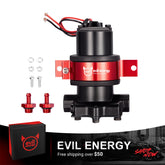
![[345LPH] High performance specs for the EVIL ENERGY 12V Electric Fuel Pump for Carb, showing a 13 PSI closing pressure and a test flow of 345 LPH at 9 PSI.](http://www.ievilenergy.com/cdn/shop/files/EVIL-ENERGY-Red-CNC-Billet-Aluminum-Valve-Cover-For-BMW-E46-E60-M52-M54_-Heat-Dissipation-_-Engine-Bay-Upgrade-EVIL-ENERGY-156912036_165x.jpg?v=1766348055)
![[Pump Only] EVIL ENERGY 12V Electric Fuel Pump for EFI external inline gear-type pump with terminal boots and ring connectors – hero image.](http://www.ievilenergy.com/cdn/shop/files/1_fedd0570-f983-4dd5-8dc6-afc188670a07_165x.jpg?v=1758595467)
![[Pump + Bracket & 2 Fittings] EVIL ENERGY 12V Electric Fuel Pump for EFI with 60 mm mounting bracket and AN fittings – external inline kit.](http://www.ievilenergy.com/cdn/shop/files/1_15fe94f5-c40d-4fec-939a-52d755d9233f_165x.jpg?v=1758595467)
![[30-70PSI,255LPH Intank]](http://www.ievilenergy.com/cdn/shop/files/1_7bc06c54-7c5c-4712-8e9c-a5fb0aad0243_165x.png?v=1741775791)
![[30-70PSI,300LPH External]](http://www.ievilenergy.com/cdn/shop/files/2_714e7585-9f07-4dff-8205-2efc2bb3642b_165x.png?v=1741775791)
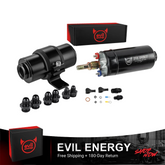

![[20-75PSI&75-120PSI,Red]](http://www.ievilenergy.com/cdn/shop/files/8_0ba8e174-2a81-408f-b59a-677f47f6df4b_165x.png?v=1758094482)
![[20-75PSI&75-120PSI,Blue]](http://www.ievilenergy.com/cdn/shop/files/7_7d56ec46-3ccf-4942-9b93-c43aa3de1f7b_165x.png?v=1758094482)
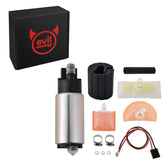

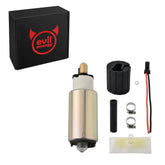

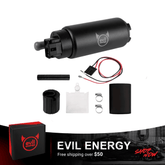

![[PTFE]](http://www.ievilenergy.com/cdn/shop/files/1_EVKT0202431_PTFE_165x.webp?v=1751867724)
![[CPE]](http://www.ievilenergy.com/cdn/shop/files/1_EVKT0202431_CPE_165x.webp?v=1751867724)
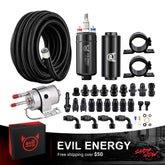

![[CPE,Black]](http://www.ievilenergy.com/cdn/shop/files/EVKT1091203_EVFS232500026000_165x.jpg?v=1767074405)
![[CPE,Red]](http://www.ievilenergy.com/cdn/shop/files/EVIL-ENERGY-CPE-PTFE-LS-Swap-fuel-kit-_Fuel-Filter_-6AN-Fuel-Line-_-Fittings-_-20-120PSI-Fuel-Pressure-Regulator-_Inline-Fuel-Pump-EVIL-ENERGY-141129936_165x.jpg?v=1767074405)
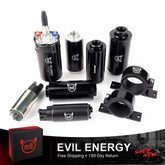

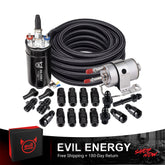

![[Antistatic PTFE] EVIL ENERGY Fuel Injection In-Line Fuel Delivery Kit - Complete Set with Free Shipping + 180-Day Return](http://www.ievilenergy.com/cdn/shop/files/1-KT11423BB-AMZ1_499ced5e-15c0-439c-a929-e540ff7ad4b9_165x.jpg?v=1755496834)
![[PTFE] EVIL ENERGY Fuel Injection In-Line Fuel Delivery Kit - Components & Packaging](http://www.ievilenergy.com/cdn/shop/files/1-KT11423BB-AMZ1_165x.jpg?v=1755496834)
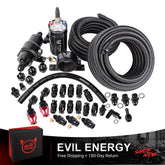

![[CPE]](http://www.ievilenergy.com/cdn/shop/files/EVIL-ENERGY-Fuel-System-Kit-for-LS-Engines-EVIL-ENERGY-155144231_165x.jpg?v=1766347898)
![[PTFE]](http://www.ievilenergy.com/cdn/shop/files/EVIL-ENERGY-Fuel-System-Kit-for-LS-Engines-EVIL-ENERGY-155144358_165x.jpg?v=1766347907)







